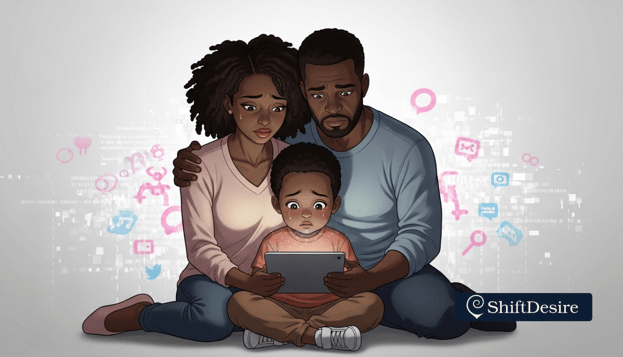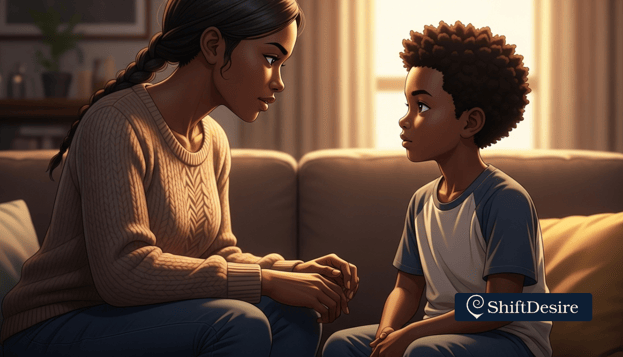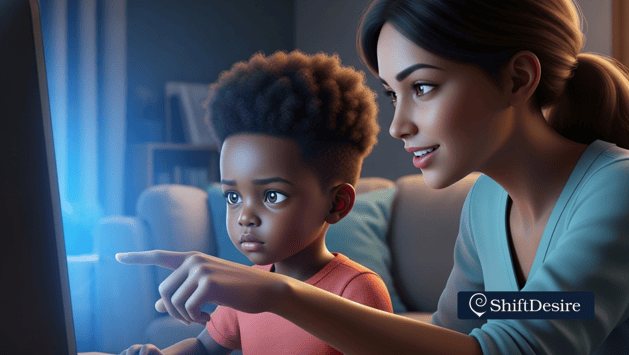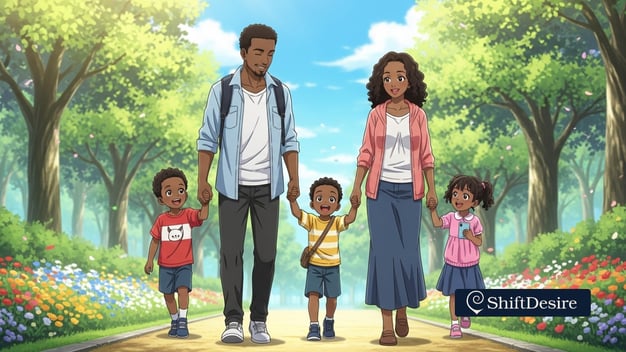5 Powerful Ways to Shield Your Child from Early Sexualization
By–Sevs Armando – ShiftDesire


She Never Thought It Could Happen in Her Own Home...
Carla was folding laundry when her 8-year-old son asked:
“Mom… what does ‘body count’ mean?”
Her hands froze. Her heart raced.
That wasn’t a math question. It wasn’t from a video game.
It was from a TikTok trend.
A phrase loaded with adult, sexualized meaning — casually echoed by kids on playgrounds, gaming chats, and YouTube videos.
Carla realized something painful:
“I’ve been so focused on keeping him safe from strangers... but I never thought I’d have to protect him from the internet itself.”
If you’re reading this... you know this fear. And you’re not alone.
The Silent Epidemic No One Warned Us About
Early sexualization isn’t always obvious.
It creeps in through:
Music lyrics labeled “clean”
Viral dance trends
Memes, jokes, and influencers
YouTube thumbnails and gaming chat rooms
It’s the erosion of childhood innocence — normalized by algorithms, peer pressure, and the absence of parental awareness.
But here’s the truth:
You can fight back. You can protect your child.
And it starts today.
5 Powerful Ways to Shield Your Child from Early Sexualization
1. Be the Loudest Voice in the Room
If you don’t talk about it... someone else will.
💡 Why It Matters:
When parents avoid conversations about bodies, boundaries, and media, kids fill the silence — with TikTok, friends, or worse, predators.
✅ How to Do It:
Start simple: “If you ever see or hear something confusing, you can always ask me.”
Use real moments (a song lyric, a commercial) as conversation starters.
Explain what’s age-appropriate and what’s not — without shame, without fear.


2. Curate Their Digital Diet — Ruthlessly
💡 Why It Matters:
The internet feeds them whatever gets clicks — not what protects them.
✅ How to Do It:
Audit all apps, games, YouTube subscriptions, and music playlists monthly.
Switch to child-safe platforms (YouTube Kids, Kidoodle.TV) but don’t trust them blindly.
Install filters like Bark, Qustodio, or Net Nanny — but remember, you are the best filter.
3. Teach Media Literacy Like Their Life Depends on It
Because... it kind of does.
💡 Why It Matters:
Kids must learn to spot:
Inappropriate jokes disguised as “funny”
Hypersexualized influencers
Manipulative ads and trends
✅ How to Do It:
Play “Spot the Trick” — pause videos and ask: “What are they really trying to show or sell here?”
Explain how algorithms push content — even bad content.
Teach them to ask: “Does this help me or hurt me?”


4. Fight Screen Addiction with Real-Life Magic
💡 Why It Matters:
Boredom is the gateway drug for harmful content.
The more screens replace real life, the more kids stumble into dangerous digital spaces.
✅ How to Do It:
Replace screen time with nature, art, sports, board games, or family cooking nights.
Create tech-free rituals: Sunday hikes, device-free dinners, or bedtime storytelling.
Show them life offline is bigger, better, and way more interesting.
5. Model What You Want Them to Become
💡 Why It Matters:
Your child isn’t just watching content.
They’re watching you.
If we constantly check phones, scroll Instagram, or laugh at inappropriate jokes... we teach them what’s normal.
✅ How to Do It:
Park your phone during meals, car rides, and bedtime.
Let them catch you reading, crafting, or calling a friend — instead of doomscrolling.
Admit when you mess up. Say: “I’ve been on my phone too much. Let’s change that together.”


Warning Signs Your Child Is Being Affected
🚩 Obsession with Trends or Apps
Constantly quoting TikTok, YouTube, or Instagram
🚩 Sudden Curiosity About Adult Topics
Asking about words, behaviors, or trends way beyond their age
🚩 Hiding Screens
Switching screens when you walk by
Deleting history or closing tabs quickly
These aren’t random behaviors. These are digital cries for help.
You Don’t Have to Be a Perfect Parent. You Just Have to Be a Present One.
The internet won’t raise your child.
Social media won’t teach them self-worth.
You will.
Your presence. Your conversations. Your boundaries. Your love.
Every time you say “Let’s talk about that”...
Every time you say “Let’s turn off the screens and do something together”...
You’re not just parenting.
You’re protecting childhood innocence.
